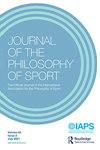Risky rescues revisited
IF 1.7
3区 哲学
Q3 ETHICS
引用次数: 0
Abstract
ABSTRACT This essay replies to Phillip Reichling’s recent article in this journal defending a principle of rescue I proposed, but rejected, in my paper, ‘Climbing high and letting die’ (2021). I argued that ‘the comparable risk principle’ imposes unreasonable demands on adventure sport athletes, for it implies that because they assume substantial risks for sport, they have duties to assume comparable risks to rescue others – duties that would otherwise be supererogatory precisely because of the risks involved. Reichling (2022) defends the principle and contends that once these athletes have assumed substantial risks for sport, they cannot reasonably claim that a rescue that involves comparable risks is too risky. I argue here, however, that Reichling fails to recognize that one can have good personal reasons for assuming risks that do not prevent one from reasonably citing comparable risks as a justification for not rescuing others. So although adventure sport athletes assume risks for personal reasons, it does not follow that they have a duty to assume comparable risks to rescue others. Reichling’s defence of the comparable risk principle is therefore unsuccessful.风险救援再次出现
这篇文章是对Phillip Reichling最近在本刊上发表的一篇文章的回应,这篇文章捍卫了我在我的论文“攀高而死”(2021)中提出但被拒绝的拯救原则。我认为,“可比风险原则”对冒险运动运动员提出了不合理的要求,因为它意味着,由于他们为运动承担了重大风险,他们有义务承担可比风险来拯救他人——正是因为所涉及的风险,这种义务本来是多余的。Reichling(2022)捍卫了这一原则,并认为一旦这些运动员为体育运动承担了重大风险,他们就不能合理地声称,涉及相当风险的救援太冒险了。然而,我在这里认为,Reichling没有认识到,一个人可以有很好的个人理由来承担风险,而这些风险并不妨碍一个人合理地引用类似的风险作为不拯救他人的理由。因此,尽管冒险运动运动员出于个人原因承担风险,但这并不意味着他们有义务承担相应的风险来拯救他人。因此,赖克林对可比风险原则的辩护是不成功的。
本文章由计算机程序翻译,如有差异,请以英文原文为准。
求助全文
约1分钟内获得全文
求助全文
来源期刊

Journal of the Philosophy of Sport
Multiple-
CiteScore
1.90
自引率
14.30%
发文量
24
期刊介绍:
The Journal of the Philosophy of Sport (JPS) is the most respected medium for communicating contemporary philosophic thought with regard to sport. It contains stimulating articles, critical reviews of work completed, and philosophic discussions about the philosophy of sport. JPS is published twice a year for the International Association for the Philosophy of Sport; members receive it as part of their membership. To subscribe to either the print or e-version of JPS, press the Subscribe or Renew button at the top of this screen.
 求助内容:
求助内容: 应助结果提醒方式:
应助结果提醒方式:


